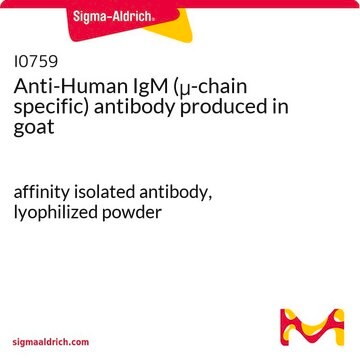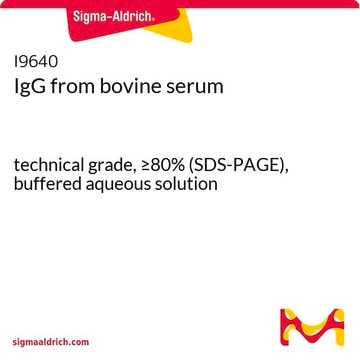B8395
Anti-Bovine IgG (whole molecule) antibody produced in rabbit
whole antiserum
Bejelentkezésa Szervezeti és Szerződéses árazás megtekintéséhez
Összes fotó(1)
About This Item
Javasolt termékek
biológiai forrás
rabbit
Minőségi szint
konjugátum
unconjugated
antitest forma
whole antiserum
antitest terméktípus
secondary antibodies
klón
polyclonal
tartalmaz
15 mM sodium azide
technika/technikák
indirect ELISA: 1:150,000
quantitative precipitin assay: 4.0 mg/mL
kiszállítva
dry ice
tárolási hőmérséklet
−20°C
célzott transzláció utáni módosítás
unmodified
Looking for similar products? Látogasson el ide Útmutató a termékösszehasonlításhoz
Egyediség
The antiserum is determined to be immunospecific for bovine IgG.
Alkalmazás
Anti-Bovine IgG (whole molecule) antibody produced in rabbit has been used as a standard to determine protein content by Bradford method using Bio-Rad protein assay dye reagent. It has also been used in several assays to develop a particle concentration fluorescence immunoassay for the quantitative determination of IgG in bovine milk.
Anti-Bovine IgG (whole molecule) antibody produced in rabbit has been used for detecting IgG antibodies in multichannel monolithic quartz crystal microbalance (MQCM).
Biokémiai/fiziológiai hatások
IgG antibody subtype is the most abundant of serum immunoglobulins of the immune system. It is secreted by B cells and is found in blood and extracellular fluids and provides protection from infections caused by bacteria, fungi and viruses. Maternal IgG is transferred to fetus through the placenta that is vital for immune defense of the neonate against infections.
Immunoglobulins G (IgGi, IgGa) of bovine milk is capable of protecting the gut mucosa against microorganisms.
Fizikai forma
Rabbit Anti-Bovine IgG is supplied as a liquid containing 0.1% sodium azide (see MSDS) as a preservative
Elkészítési megjegyzés
treated to remove lipoproteins
Tárolás és stabilitás
For continuous use, store at 2-8 °C for up to one month. For extended storage, the solution may be frozen in working aliquots. Repeated freezing and thawing is not recommended. Storage in "frost-free" freezers is not recommended. If slight turbidity occurs upon prolonged storage, clarify the solution by centrifugation before use.
Jogi nyilatkozat
Unless otherwise stated in our catalog or other company documentation accompanying the product(s), our products are intended for research use only and are not to be used for any other purpose, which includes but is not limited to, unauthorized commercial uses, in vitro diagnostic uses, ex vivo or in vivo therapeutic uses or any type of consumption or application to humans or animals.
Nem találja a megfelelő terméket?
Próbálja ki a Termékválasztó eszköz. eszközt
Tárolási osztály kódja
10 - Combustible liquids
WGK
nwg
Válasszon a legfrissebb verziók közül:
Már rendelkezik ezzel a termékkel?
Az Ön által nemrégiben megvásárolt termékekre vonatkozó dokumentumokat a Dokumentumtárban találja.
Az ügyfelek ezeket is megtekintették
Development of a particle concentration fluorescence immunoassay for the quantitative determination of IgG in bovine milk
Jack NL, et al.
Journal of Agricultural and Food Chemistry, 41(4), 682-686 (1993)
Effect of thermal protectants on the stability of bovine milk immunoglobulin G
Chao-Cheng C and Hung-Min C
Journal of Agricultural and Food Chemistry, 46(9), 3570-3576 (1998)
Real-time multianalyte biosensors based on interference-free multichannel monolithic quartz crystal microbalance
Jaruwongrungsee K, et al.
Biosensors And Bioelectronics, 67, 576-581 (2015)
S Hashira et al.
Pediatrics international : official journal of the Japan Pediatric Society, 42(4), 337-342 (2000-09-15)
Maternal immunoglobulin G (IgG), transferred across the placenta to the fetus during intrauterine life, is an important component of the neonatal immunological defence mechanisms against infection. There is controversy with respect to differences in placental transfer of the different IgG
Tudóscsoportunk valamennyi kutatási területen rendelkezik tapasztalattal, beleértve az élettudományt, az anyagtudományt, a kémiai szintézist, a kromatográfiát, az analitikát és még sok más területet.
Lépjen kapcsolatba a szaktanácsadással










